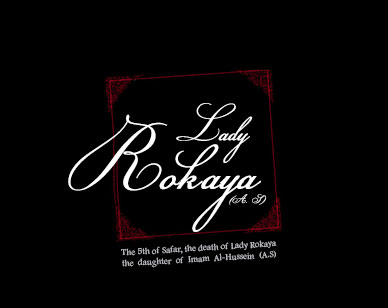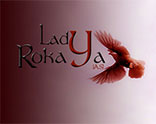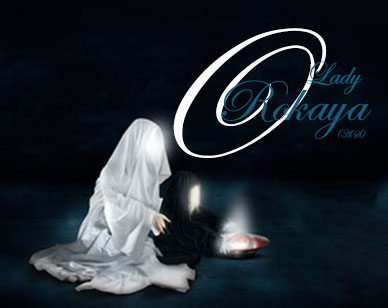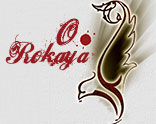Lady Rokayya (SA) was buried in the same dungeon. Lady Rokayya (AS) held the still child as Imam Zain-ul Abideen dug a grave for her sister in the dungeon. Her clothes were burnt in Kerbala, and due to injuries, had intermingled with her flesh. Therefore, she was buried in the same burnt, ripped clothes right there in he Dungeon of Syria .
When the time came and they were released from the prison, lady Rubab (mother of lady
Rokayya) came to the grave of her beloved daughter (SA), put her cheek on lady
Rokayya (A.S)'s grave and cried out,
"Speak to me Rokayya. Only a word, my child, speak to me".
Lady Rokayya's body was removed from its original burial place, Dungeon of Syria, some centuries later, when a pious man of Damascus was informed in his dream that water was pouring into the grave of this young Hashmite princess (SA). Upon confirmation that ground water was actually entering the grave, lady
Rokayya's body was buried in a new shrine near Yazeed's palace, where she rests today. Her body was in the condition that if she had been buried the same day.
It was her father Imam Hussein (AS) who was brutally killed in Kerbala. It was her baby brother Ali Asghar (AS) who had an arrow shot through his neck. It was her beloved uncle Abbas (AS) that had both his arms cut off. It was she who spent her last days in a dungeon. The little princess of Imam
Hussein (AS). The only person to never make it out of that desolate dungeon. She was lady
Rokayya (SA), the young Hashemite princess.
On this occasion of mourning in the household of the Prophet Muhammad, I extend my condolences to the Prophet Muhammad and his Ahlul Bayt (AS) and our 12th Imam (May
Allah hasten his honorable revelation). May the curse of Allah (swt) be on those who inflicted pain upon the Prophet and his holy family (AS).
I am Rokayya, today is Ashoura and here is Karbala
Perhaps an hour has passed noon. I do not know. From morning to now, for us, it has seemed like a lifetime; especially these moments that father has gone towards the battlefield. It is hard to gaze at the cloud of dust rising in the battlefield and to hear the shrieks of the enemy, while father is among them; it is very hard.
The sound of the drums beating and the shrill screams of the enemy make our hearts sink. We are surrounded with dust and blood.
The sunshine above us is hot and the earth beneath, even hotter. Thirst, thirst, our mouths are burning from thirst, our lips have dried up like parched clay, our tongues are hard and dry in our mouths and our faces have become pale from the extreme heat. My father had only seventy-two soldiers while Yazid had an army of tens of thousands.
Since morning, my father's followers have gone to the battlefield one by one. They stood bravely against the enemy's army, they fought with courage, they killed tens of the enemy soldiers and then they were martyred. Now, my father is all alone, surrounded by the soldiers of the enemy.
Oh, how I wish the distance between the tents and the battlefield was not this long. How I wish I could see father fighting. How I wish father had let me go with him. A father fighting alone against a vast army and his restless daughter having no news about him! The only thing visible from here is a haze of dust and dirt and the only thing hearable is the uproar of the enemy.
Yesterday, the wrinkles of weariness were clearly visible in my father's expression. Thousands of people from Kufa and other cities had written him letters and promised to support him if he rose against Yazid's ruthless government.
But only seventy-two people came to help him. Those seventy-two people were very dear to my father. My father told them,
"You are the best of people.
I do not know any followers more loyal and faithful than you; no one has ever had followers as fine as mine."
We all cried when they were martyred but father did not show his sorrow. When my older brother Ali-Akbar fell down from his horse we all lost heart but father did not.
When the enemies' arrow ripped Ali-Asghar's throat on my father's hands, we started wailing and weeping, but father stood firm. When my uncle Abbas, who was father's flagman, the sentinel of the tents and the provider of water, fell from his horse and the enemy cut his body to pieces.
My father kept his patience; but his stature was bent and he put his hands on his waist crying, "My back broke".
When all of my father's followers became martyred, my father prepared himself to go to the battlefield, but first he gathered all the women and children and told them with calmness, "Make yourselves ready for affliction and hardship. Be sure that God is your protector. He will soon save you from the enemy and you shall have a fine destiny. And your enemies will experience all kinds of torture and suffering. Instead of these sufferings, God will give you many blessings and treat you with generosity. So do not complain about anything and do not say thing that decrease your dignity."
After this, we were all sure that father would be martyred. I said, "Father, have you surrendered yourself to death?" Then I burst into tears and cried and cried. I did not want to act impatiently, but I no longer had the power. I was not the only one that was restless. Even my aunt,
Zeinab who tried to comfort us, was wiping away her tears.
Father hugged me and said: "Sweetheart, how can someone with no allies not surrender to death?"
I started sobbing again and said: "Under whose care will you put us?"
Father wiped my tears with his hands and lips and after kissing my wet eyelashes said, "I put you under the care of God and His blessings; He who supports you in this world and the afterworld. Have patience, my daughter, about the things that God wants and don't complain, because this world will come to an end and but the afterworld remains."
I did not complain and I was not ungrateful, but I cried and cried. How could I not cry, while my father, the best father in the world, was going to the battlefield all-alone to stand against thousands of men? Father said farewell to everybody and stroked the children's hair affectionately.
Then he whispered things to my aunt Zeinab that we could not understand. After that, he told her to bring him an old garment. We were all surprised and asked, "Why do you want an old garment?" Father answered: "The enemy is an unmanly one. After killing me, they will take my clothes as spoils. I want to wear an old garment under my clothes so my body will not be bare after I'm martyred."
It was as if father was going to a splendid ceremony. He put on his clothes, fastened his sword and armor, wiped the sweat of his forehead with his turban, then tidied his gray beard and prepared to go.
To go towards a savage enemy that was awaiting him with barbaric shrieks.
None could prevent him from going and even if he did not go, the enemy would come to the tents. No one could prevent him from going, because he had foretold his death before this day and he had said that Islam would only survive if he were martyred. No one could tell him, "Father, don't go!" "Uncle, don't go!" "Brother, don't go!"
Because he was the Imam of all, and we all knew that the Imam only does what God wants. However, we only wanted him to stay with us one more moment, so we could see him, speak with him and listen to his voice a little longer.
My aunt Zeinab, trembling, cried out with tearful eyes, "Not so fast dear brother, not so fast."
Father stood and for one last time looked at the crowd of distressed women and children who were crying after him. If anyone other than father had seen this scene, he would have surely slowed his pace; but there was no change in father's faith and decision and he did not slow his pace. He just gave us an affectionate wave with his hand, put us under the care of God, and hurried towards his horse.
I could not bare it any more. This was too little for me; I, who in a few moments would lose such a good father and become an orphan. I stood up involuntarily and without father seeing me, ran towards his horse. Father was sitting firmly on his horse and was getting ready to go. However, the horse did not move because I had clasped my hands tightly around its legs. The horse was staring into my eyes and was crying with my cries. Father got off his horse and held me tight to his chest. He wiped my tears and said,
"Oh my daughter, my dear daughter."
I said, "Oh father. When Moslem was martyred, you hugged his orphan girl and patted her head. If you go and I become an orphan who is going to pat my head?" Father's eyes filled with tears. I could feel his heart breaking. While fighting back his tears, he slowly whispered to me, "Rokayya, my daughter, please do not cry, because after I go you will shed many tears. While I am here, while I am still alive, do not set my heart ablaze with your tears.
Oh, best daughter in the world, truly after I go you have the most right to cry. "I knew it was impossible, but I don't know why I said, "Father, take us back to Medina beside the shrine of our grandfather, the Prophet (peace be upon him and his household)."
Father turned his innocent look towards the enemy and said, "You know it's not possible my daughter." The shrieks and screams of the enemy were becoming louder and father had to go. Father set off and I could still feel the warmth of his dried lips on my cheeks. Now I can hear the clanging of swords and the neighing of horses and the savage screams of the enemy. We are standing beside the tents; we are holding our breaths and shivering with fright.
Oh, I think this is my father's horse coming towards us without a rider, its head and mane covered in blood. Is this the sound of my cry or Fatima's or
Rokayya's?.



















